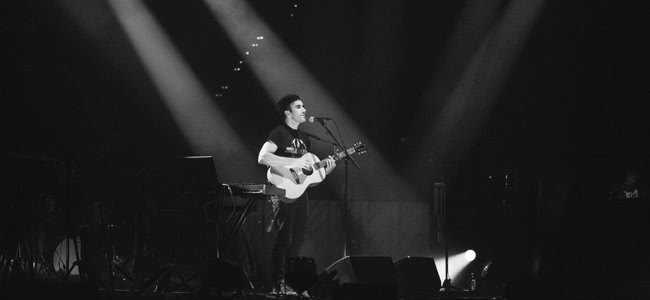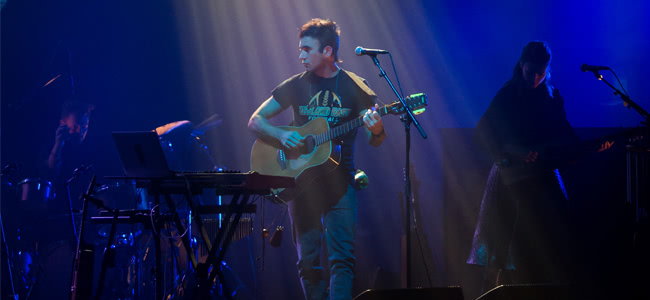On Friday 22nd May
Four years ago Sufjan Stevens brought his most extravagant, over-the-top show to Australia. These were deliberately attention-grabbing, sensor-overloading performances, filled with choreographed dance-moves, costumes and an overwhelming amount of instruments, off the back of his weirdest and most divisive album yet, Age of Adz.
Four years later, Stevens returns to our shores. This show is the antithesis of his last visit.
And that’s not to say that the Age of Adz tour was bad or unsatisfactory, it was incredible in its own right, but it’s impossible not to think that this is how Stevens is supposed to be seen. It’s a testament to his musical genius that he can perform two such starkly contrasting shows, and for both of them to just work so well.
For this whirlwind Australian tour, a run of four shows at the Opera House as part of VIVID Festival (“a celebration of lights on buildings and stuff” according to Sufjan), Stevens has brought along only four other musicians, who usually add subtle musical layers before retreating back into the darkness. It’s a subtle and intricately restrained performance. Stevens has shed the electronic robo suit for a simple jeans, t-shirt and cap combination, symbolically representing the change in performance.
It begins quietly, with Stevens alone on stage played the instrumental ‘Redford (For Yia & Pappou)’ on piano, before he’s joined by the backing band to perform the wonderful Carrie & Lowell pretty much in full, as promised. The order is played around with a bit, but all the songs are there, except for closer ‘Blue Bucket of Gold’ which would make an appearance later on.
The influence of Age of Adz is definitely still there, with a handful of the new songs reworked with some electronic elements, most notably on ‘Should Have Known Better’. This works well to break up the mostly quiet album for the live setting, and the advent of a drummer (there are no drums on Carrie & Lowell) also serves to give the songs more variations for the performance.
Stevens’ latest and perhaps best album translates fantastically live. The unexpected louder moments are cathartic, but it’s the intimate, sparse times when it’s Stevens alone on guitar that are the most poignant. It’s an intensely personal performance, as is the album as a whole, and it’s clear that the songs are still very emotional for him, it’s all still very raw. ‘Eugene’ provides an especially powerful moment, with the concluding line of “what’s the point of singing songs, if they’ll never even hear you?”. After abruptly ending the song after this line, Stevens takes a quick moment to collect himself, wipe his face and eyes, take a deep breath, then continues on.
[include_post id=”448272″]
Carrie & Lowell standout ‘Fourth of July’ gets a makeover of sorts as well, with Stevens managing to retain the song’s central foundation while also building upon it to give a new feel to it. Not many other shows could manage to have the repeated “we’re all gonna die” chorus be one of the more upbeat moments, but here it just works perfectly.
The slightly obscure ‘The Owl and the Tanager’, from the EP All Delighted People, offers the first taster of older material. And from this point on there’s a hushed sort of anticipation in the sold-out Sydney audience. After the last tour, nobody has any real idea what older material he’ll draw on, if any. It’s very hard to think that anyone could leave disappointed with the songs selected, with a healthy serving from Seven Swans and Illinois, and a range from his other albums.
Stevens goes the entire first half of the show without saying anything to the crowd between songs. This makes sense, most of this part of the show is playing Carrie & Lowell in full with little if any breaks in between songs. It creates a mesmerising atmosphere that would be broken with banter. When Stevens does finally talk, it’s a whispered “thank you” followed by a deep philosophical musing on life and death and the purpose of existence. It’s a strangely apt discussion too, with his newest album focusing on the passing of Stevens’ mother and him coming to terms with this. “Death is the true refinery,” he begins with, before talking about the “eternity of experience”. Carrie & Lowell sees Stevens grappling with loss and struggling for a purpose, and this is obviously still something he’s coming to terms with.
He pinpoints something that his old basketball coach, who used to call him ‘Steven’ told him that has become his catch cry of sorts: “look alive”. “I know this sounds pretty bleak, but it’s not, it doesn’t have to be,” he continues, and this could be applied to the album and performance as a whole. Most of the songs are very, very sad, exploring the brutal reality of life at its hardest, but there’s always a glimmer of hope and joy, of possibility.

‘Casimir Pulsaki Day’ is a clear highlight of the night. It’s a harrowing tale of a friend’s death told over the top of happily strummed guitar and banjo and trombone lines. The song draws on many of the themes that Stevens would explore more in depth on Carrie & Lowell, and the haunting ending of “and he takes and he takes and he takes” is extended and resonates across the entire Opera House. It’s haunting and altogether beautiful.
Stevens’ voice is a different entity entirely in the live setting. It’s somehow at the same time both powerfully assured and intimately vulnerable. It’s constantly faltering and wavering with emotion, but it never comes close to breaking.
The only song from Age of Adz to make an appearance is ‘Futile Devices’, and it’s no coincidence that this is the one song on the album based around acoustic guitar. He revisits the latest album for ‘Blue Bucket of Gold’ to bring the main set to a close. It begins pretty normally with Stevens on piano, but slowly evolves into a swirling, gigantic wall of loud, distorted noise. In the a recent Triple J interview, Stevens describes this part of the song as the only way he could come up with to finally farewell his mother, to set her free. For the performance, it’s extended greatly and developed upon to create a spine-tingling, shimmering ending. Stevens and his band eventually emerge at the front of the stage, signalling the end. They’re met with an overwhelming and deserved standing ovation and for a while they just stand there and take it all in.
The encore break is just long enough to make you think he might not be coming back at all, but then Stevens walks slowly back onto stage. He’s alone on the piano for the enchanting ‘Concerning the UFO Sighting Near Highland, Illinois’, before the four-piece band return. After being momentarily stumped over which fret to put a capo on, the disarmingly simple ‘The Dress Looks Nice on You’ offers a bright, happy light in contrast to much of the more heavy-going material. The banjo-heavy ‘For the Widows in Paradise’ is taken to another level by the harmonies between the band during the devastating refrain of “I did everything for you”.
His four-piece backing band are stunning across the night, offering subtle additions to each song and shining during the louder moments. They do just enough to complement everything Stevens is doing, but never take the attention away from him.
After acknowledging his return to Australia (“It’s great to be back, it never gets old”), Stevens prepares for the last song. Despite the immeasurable difference between this show and the last Australian visit, they both end in the same way: ‘Chicago’. This is a very different version of the song though, with the lead brass section replaced by the synthesizer, and much more of the focus on the whispered vocals. It’s a glorious, faultless song, with the moments of layered, textured sound expertly crafted before being quickly stripped away, leaving just Stevens’ vocals and a few piano chords. It’s a welcome, celebratory way to bring the night to a close.
It’s the sort of show that makes all others seem empty and lacking of substance. It’s a performer in his prime laying bare his brutally honest and personal songs in front of a raptured crowd that are silent and overwhelmingly loud in all the right moments.
“All my songs are about death, even the happy strummy ones,” Stevens mutters at one point in the night. The inescapable overriding theme of death and loss is unavoidable across the entire performance. They’re powerful and challenging emotions, ones that the performer is trying to wrap his head around right in front of us. But the performance as a whole has a distinct air of life-affirming inspiration and hope, of possibility. Ultimately it’s a celebration of music and life, one that constantly circles back around to Stevens’ adopted motto: “look alive”.
Setlist
Redford (For Yia-Yia & Pappou)
Death With Dignity
Should Have Known Better
Drawn to the Blood
All of Me Wants All of You
Eugene
John My Beloved
The Only Thing
Fourth of July
No Shade in the Shadow of the Cross
Carrie & Lowell
The Owl and the Tanager
In the Devil’s Territory
To Be Alone With You
Casimir Pulaski Day
Futile Devices
Blue Bucket of Gold
_________
Concerning the UFO Sighting Near Highland, Illinois
The Dress Likes Nice on You
For the Widows in Paradise, For the Fatherless in Ypsilanti
Chicago



































